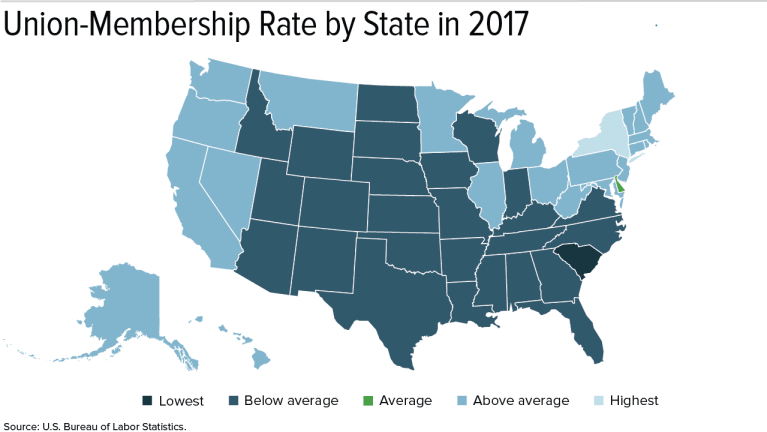I
In a 5-4 vote on June 27, the justices held that states and public-sector unions may no longer require workers to pay agency fees. "Neither an agency fee nor any other payment to the union may be deducted from a nonmember's wages, nor may any other attempt be made to collect such a payment, unless the employee affirmatively consents to pay," Justice Samuel Alito Jr. wrote for the majority.
In dissent, Justice Elena Kagan said the decision will have large-scale consequences. "Public employee unions will lose a secure source of financial support. State and local governments that thought fair-share provisions furthered their interests will need to find new ways of managing their workforces," she wrote.
"This decision frees public-sector employees from being forced to pay union fees as a condition of working for the government," said Kevin Kraham, an attorney with Littler in Washington, D.C. "This is a landmark win for workers' rights and the First Amendment, and a significant loss for public-sector labor unions."
In recent years, there has been a renewed interest at the state level in banning mandatory union fees. Currently, 28 states have "right-to-work" laws that make it illegal to require workers to join a union or pay related fees as a condition of employment. But some of those state laws affect only the private sector.
The Supreme Court's ruling makes every state a right-to-work state for the public sector, said Shannon Farmer, an attorney with Ballard Spahr in Philadelphia.
[SHRM members-only HR Q&A: What is a "right-to-work" state?]
"The decision means unions must drive a better value proposition to keep current members and attract new ones," said Daniel Guttman, an attorney with BakerHostetler in Columbus, Ohio. Now that fees are not guaranteed from all unionized public-sector employees, the services a union provides will need to become more apparent in order to retain their current membership levels, he said.
The Society for Human Resource Management believes in the fundamental right—guaranteed by the National Labor Relations Act—of every employee to make a private choice about whether to join a union, according to SHRM's 2018 Guide to Public Policy Issues.
Unionization Rates
Union membership in the United States has significantly declined in recent years. In 2017, 10.7 percent of workers were union members, compared to about 20 percent in 1983, according to the U.S. Department of Labor's Bureau of Labor Statistics (BLS).
In 2017, 7.2 million public-sector and 7.6 million private-sector employees belonged to a union. Although the actual head count was similar in each sector, a much higher percentage of public-sector workers (34.4 percent) than private-sector workers (6.5 percent) were unionized.
BLS statistics showed that union-membership rates were highest for local government workers (40.1 percent), such as teachers, police officers and firefighters. In the private sector, unionization rates were highest in utilities (23.0 percent), transportation and warehousing (17.3 percent), telecommunications (16.1 percent), and construction (14.0 percent).
Seven states—California, Illinois, Michigan, New Jersey, New York, Ohio and Pennsylvania—account for over half of the nation's union membership, according to the BLS.

Controversial Case
In Janus v. AFSCME Council 31, U.S., No. 16-1466, the Supreme Court was asked to decide if public-sector employees can be required to pay union fees as a condition of employment. Mark Janus, an Illinois state employee, claimed that such fees are unconstitutional under the First Amendment's rights to free speech and association.
Janus asked the court to overturn its 1977 ruling in Abood v. Detroit Board of Education. In that case, the Supreme Court held that government employees could be required to pay "agency" or "fair-share" fees to cover the cost of collective bargaining, contract administration and grievance adjustments—but that employees can't be forced to cover a union's political activities, such as lobbying.
Janus argued that collective bargaining is inherently political and that Abood should be overruled because it failed to apply heightened First Amendment scrutiny. "Employees are forced to pay a union for suppressing their own rights to speak and contract for themselves," his petition said. "This is perverse, akin to requiring kidnapping victims to pay their captors for room and board."
Union advocates, however, argue that agency fees prevent workers from "free riding," or reaping the benefits of union representation without paying for it. This is because unions are required to represent all workers in a bargaining unit regardless of whether they pay fees.
The justices considered the same issue in Friedrichs v. California Teachers Association, No. 14-915. Experts who closely watched the case predicted that it would be decided 5-4 in favor of the worker who opposed mandatory fees, with Justice Antonin Scalia voting in the majority. However, Scalia passed away in February 2016 before a decision was reached, and the remaining justices deadlocked with a 4-4 vote.
The tie vote in Friedrichs left intact a 9th U.S. Circuit Court of Appeals ruling that such fees are permissible. Since then, conservative Justice Neil Gorsuch has joined the Supreme Court, and he cast the tie-breaking vote.
Gorsuch, along with Chief Justice John Roberts Jr. and Justices Anthony Kennedy and Clarence Thomas, joined the majority. Justices Stephen Breyer, Ruth Bader Ginsburg and Sonia Sotomayor joined the dissent. Sotomayor also filed a separate dissenting opinion.
Divided Reactions
The high court's decision has been met with mixed reactions from lawmakers. Some Republican legislators applauded the decision. "The Supreme Court's ruling that millions of public sector employees will no longer have to financially support an organization they disagree with, just to keep their jobs, is a victory for free speech and a victory for the American workforce," said Reps. Virginia Foxx, R-N.C., and Tim Walberg, R-Mich., in a press statement.
However, some Democratic leaders criticized the Supreme Court's ruling. "Corporate interests have been rigging the system against workers for decades—and the Supreme Court just handed those interests a huge victory in Janus v. AFSCME," tweeted Sen. Elizabeth Warren, D-Mass. Tom Perez, the Democratic National Committee chair and former secretary of labor, tweeted that the decision "is nothing more than blatant and disgraceful union busting."
An organization run by AI is not a futuristic concept. Such technology is already a part of many workplaces and will continue to shape the labor market and HR. Here's how employers and employees can successfully manage generative AI and other AI-powered systems.




